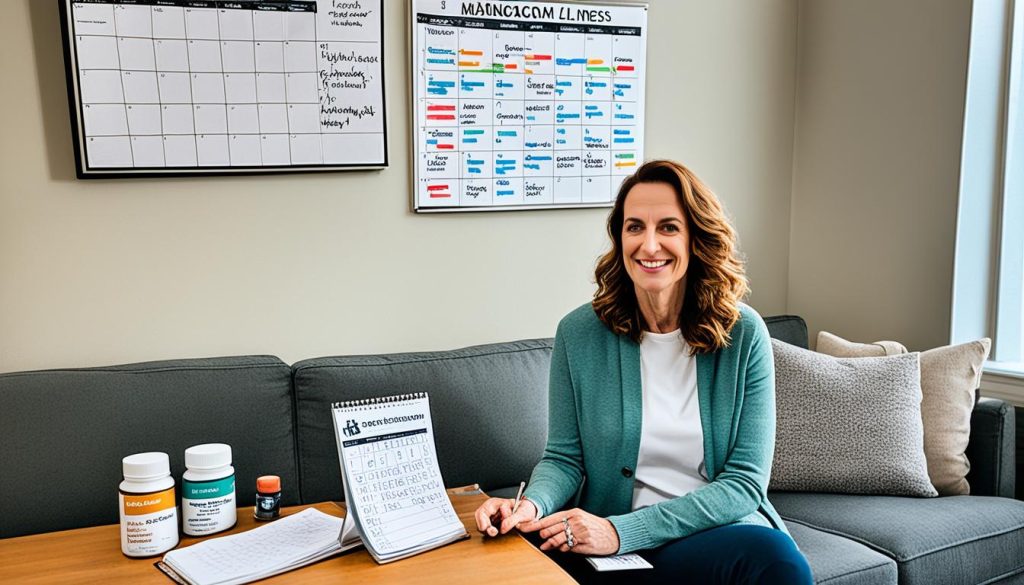As someone who has spent a decade loving a woman with chronic illnesses, including endometriosis and fibromyalgia, I understand the challenges and uncertainty that arise in such relationships. Sharing my wife’s journey has profoundly shaped me into the person I am today, and I have become an advocate for her and other men in my position. Through my blog, I share my knowledge and expertise, offering support and guidance to those coping with the complexities of supporting a partner with a chronic illness. Not only is this a way for me to help others, but it also serves as a therapeutic outlet for me, allowing me to find strength and inspiration in sharing our story.
Navigating Uncertainty in a Long-Term Relationship
When you and your partner have been together for a significant period of time, navigating uncertainty in your relationship can be challenging. But what happens when that uncertainty is related to your partner’s health condition? Facing the unknown can bring about emotions of fear, worry, and confusion. It’s essential to find ways to cope with and address the uncertainty you may encounter.
Honest and open communication about the future of your relationship is crucial. This means discussing your partner’s health condition, understanding its implications, and exploring potential challenges that may arise. By having these conversations, you can gain clarity and develop a shared understanding of what the future may hold.
Couples therapy can be immensely helpful in navigating uncertainty together. A trained professional can guide you through the emotional and practical aspects of dealing with a partner’s health condition. Couples therapy provides a safe space for both of you to express your fears, concerns, and hopes for the future, while also offering practical strategies to manage the challenges that may arise along the way.
It’s important to acknowledge that being a caregiver for a partner with a chronic illness can have a significant impact on your mental wellness. It’s common to experience feelings of stress, anxiety, and even burnout. Taking care of yourself and seeking support is vital to maintaining a strong relationship amidst uncertainty. Remember that you can’t pour from an empty cup, so prioritize self-care and reach out to friends, family, or support groups who can offer understanding and assistance.
As you navigate uncertainty in your long-term relationship, remember that love, patience, and understanding are the foundations that will help you weather any storm. Embrace open communication, seek professional help when needed, and continue to support each other’s well-being. By facing the unknown together, you will strengthen your bond and build a foundation of resilience and hope for the future.
Strategies for Managing Uncertainty in a Relationship
In a relationship with a chronically ill partner, managing uncertainty is crucial for maintaining a strong and supportive bond. Here are some strategies to help you navigate the challenges and uncertainties that may arise:
- Establish clear communication: Open and honest communication is the foundation of any successful relationship. Both partners should feel comfortable expressing their needs, concerns, and boundaries. By creating a safe space for open dialogue, you can better understand each other’s perspectives and work together to find solutions.
- Regular check-ins: Schedule regular check-ins to discuss any challenges or changes that may arise. These check-ins provide an opportunity to address any issues, make necessary adjustments, and offer support to each other. By proactively addressing concerns, you can prevent misunderstandings and strengthen your connection.
- Practice active listening: Listening is an essential part of effective communication. Practice active listening by giving your full attention to your partner. Show empathy, validate their feelings, and ask open-ended questions to foster a deeper understanding of their experience. This will facilitate a stronger emotional connection and build trust.
- Set aside time for self-care: Managing uncertainty and supporting a partner with a chronic illness can be emotionally and physically draining. It’s important to prioritize self-care to maintain your own well-being. Set aside dedicated time for activities that bring you joy and relaxation. This can include exercise, hobbies, meditation, or spending time with loved ones.
By implementing these strategies, you can effectively manage uncertainty and strengthen your relationship with your chronically ill partner. Remember, open communication, empathy, and self-care are key to navigating the challenges that uncertainty may bring.

The New Normal with Chronic Illness: Lifestyle and Adaptations
Living with a chronic illness often requires making lifestyle adaptations and embracing a new normal. It’s a journey that both partners embark on together, supporting each other and finding ways to navigate the challenges that come with chronic illness.
Adapting to a new normal means making changes to daily routines, habits, and expectations. It involves finding a balance between managing the illness and maintaining a fulfilling life. This process requires flexibility, understanding, and a commitment to adapt together as a couple.
Some lifestyle adaptations may include:
- Modifying daily routines to accommodate medical appointments, treatments, and self-care.
- Creating a supportive environment at home by making necessary adjustments to the living space and equipment.
- Exploring alternative therapies and lifestyle choices that can enhance well-being.
- Seeking external support from medical professionals, support groups, and community resources.
Remember, embracing a new normal does not mean abandoning the life you once knew. It means finding creative solutions and making adjustments to accommodate the challenges of chronic illness. Together, you can build a life that is fulfilling, despite the limitations.
When adapting to a new normal, it’s essential to communicate openly and honestly with your partner. Share your needs, concerns, and dreams for the future. This open dialogue will foster understanding and strengthen your bond as you navigate the uncertainties that the chronic illness brings.
Patience and empathy play crucial roles in supporting each other through lifestyle adaptations. It’s essential to acknowledge the emotional impact of these changes and provide the necessary support and encouragement. Celebrate the small victories and milestones along the way, and remember to prioritize self-care for both yourself and your partner.
Together, you can embrace the new normal, making the necessary lifestyle adaptations and overcoming challenges with resilience and love.
Lifestyle Adaptations Checklist:
| Adaptation | Description |
|---|---|
| Modifying Daily Routines | Adjusting schedules and activities to accommodate medical needs and self-care practices. |
| Creating a Supportive Environment | Making physical changes to the living space and acquiring necessary equipment to ensure comfort and accessibility. |
| Exploring Alternative Therapies | Investigating and incorporating complementary therapies, such as acupuncture, yoga, or meditation, to support overall well-being. |
| Seeking External Support | Connecting with medical professionals, support groups, and community resources to access additional assistance and guidance. |

Loving a Woman with a Chronic Illness
When you have a partner who is a woman with a chronic illness, providing emotional support is essential. She needs to know that you are there for her, ready to listen, understand, and validate her experiences. Your patience, support, and willingness to make accommodations when necessary can make a significant difference in her well-being.
As her partner, it is crucial to offer a listening ear and create a safe space for open communication. Let her know that you empathize with her challenges and that she can count on you for support. Validate her experiences by acknowledging her pain, frustrations, and triumphs. Show her that you understand the impact of her chronic illness on her daily life and overall well-being.
Educating yourself about her specific condition and understanding its physical and emotional effects can greatly contribute to a healthy and supportive relationship. By gaining knowledge about her illness, you can better comprehend her needs, anticipate potential challenges, and provide informed assistance. This will demonstrate your commitment and dedication to supporting her on her journey.
Additionally, it is important to be patient and understanding when her illness affects her energy levels, mood, or ability to engage in activities. Be flexible and adapt plans to accommodate her needs. This may involve making adjustments to your schedules, finding new ways to spend time together, or exploring activities that are compatible with her condition.

Remember, supporting a woman with a chronic illness is not just about providing physical assistance; it is also about being emotionally present and supportive. Your love and care can make a significant impact on her overall well-being and the strength of your relationship.
Mental Health Effects of Dealing with an Ill Partner
When your partner is facing a chronic illness, it’s natural for both of you to experience significant impacts on your mental health. As a caregiver, you may find yourself facing increased stress, anxiety, and feelings of isolation. It’s important to recognize the toll that this can take on your well-being and take proactive steps to prioritize your mental health.
One of the key factors in managing the mental health effects of dealing with an ill partner is open and honest communication. By sharing your emotions and concerns with each other, you can provide mutual support and understanding. Expressing your feelings can be a cathartic process and help alleviate the burden of uncertainty that often accompanies a partner’s health condition.
Additionally, seeking support is essential. Whether it’s through professional therapy, support groups, or leaning on friends and family, don’t hesitate to reach out for help. Connecting with others who are going through similar experiences can provide a deep sense of validation and comfort.
Let’s not underestimate the power of self-care either. Taking care of your own physical and mental well-being is crucial in order to effectively support your partner. Find activities or hobbies that bring you joy and peace, practice mindfulness or meditation, and make sure to carve out time for yourself. Remember, you can’t pour from an empty cup.
The mental health effects of dealing with an ill partner can be significant, but by prioritizing open communication, seeking support, and practicing self-care, you can navigate these challenges with strength and resilience.
Key takeaways:
- Maintain open and honest communication about your emotions and concerns.
- Seek support through therapy, support groups, or trusted loved ones.
- Make self-care a priority by engaging in activities that bring you joy and peace.

| Effects of Dealing with an Ill Partner | Strategies to Manage Mental Health |
|---|---|
| Increased stress and anxiety | Open and honest communication about emotions |
| Feelings of isolation | Seeking support through therapy or support groups |
| Emotional burden of uncertainty | Practicing self-care and prioritizing personal well-being |
Coping with a Partner’s Chronic Illness: Seeking Professional Help
When faced with the challenges of coping with your partner’s chronic illness, seeking professional help can provide valuable support and guidance. Professional counseling or therapy can offer a safe space for you to process your emotions, learn effective coping strategies, and improve communication and dynamics in your relationship.
Dealing with a partner’s chronic illness can lead to a range of emotions, including stress, frustration, and sadness. It is essential to have someone to talk to who can help you navigate these emotions and provide practical advice.
Professional help can also assist you in managing the uncertainties that come with being a caregiver for a partner with a chronic illness. Therapists and counselors can provide insights and coping mechanisms to help you better understand and cope with the emotional toll of caregiving.
“Seeking professional help can provide a safe space for you to process your emotions, learn effective coping strategies, and improve communication and dynamics in your relationship.”
Additionally, professional guidance can help you build a supportive network and connect you with resources and support groups specifically tailored to individuals who are coping with a partner’s chronic illness. These support systems can help alleviate feelings of isolation and provide you with opportunities to share your experiences and learn from others facing similar challenges.
Remember that seeking professional help does not indicate weakness or a lack of ability to cope. In fact, it demonstrates strength and a commitment to your well-being and the health of your relationship.
Tips for Finding a Professional
- Consult with your primary care physician or ask for recommendations from trusted friends or family members who may have experience with therapy or counseling services.
- Search online directories and read reviews to find therapists or counselors specializing in chronic illness and relationships.
- Consider the approach and expertise of the professional to ensure they are a good fit for your needs.
- Don’t hesitate to reach out to multiple professionals or try different therapists until you find the right one for you.
Featured Professional: Dr. Amanda Richards, LMFT
Dr. Amanda Richards is a licensed marriage and family therapist specializing in supporting individuals and couples navigating the challenges of chronic illness. With over 10 years of experience, she offers a compassionate and empathetic approach to therapy, helping clients develop effective coping strategies and enhance their relationships. Dr. Richards believes in the power of therapy to foster resilience and personal growth.
For more information or to schedule a session with Dr. Amanda Richards, visit her website: www.dramandarichards.com.
The Impact of Uncertainty on Relationships
Uncertainty can have a significant impact on relationships, especially when it is related to a partner’s chronic illness. The unpredictable nature of the illness and the unknowns surrounding it can create strain and challenges within the relationship. It is crucial for both partners to acknowledge and address the impact of uncertainty on their dynamics in order to navigate these difficulties effectively.
One of the key ways to manage uncertainty in a relationship is through regular check-ins. These check-ins provide an opportunity for open and compassionate communication, allowing both partners to express their needs, concerns, and fears. It is important to create a safe and supportive space where both partners can share their emotions and work together to find solutions.
Seeking outside support can also be beneficial when managing uncertainty in a relationship. Whether it’s through couples therapy or individual counseling, professional help can provide guidance, tools, and techniques to navigate the challenges that uncertainty brings. It can also offer a fresh perspective and help both partners gain insights into their own emotions and behaviors.
Maintaining intimacy and emotional connection is another crucial aspect of managing uncertainty in a relationship. The uncertainty of a partner’s chronic illness can sometimes lead to a focus on practical matters, such as treatments and appointments, which may cause the emotional connection to suffer. Finding ways to prioritize and nurture the emotional bond can help strengthen the relationship and provide a source of support for both partners.
In summary, the impact of uncertainty on relationships, particularly in the context of a partner’s chronic illness, should not be underestimated. It is essential for both partners to actively address and manage the challenges that uncertainty brings. Through open communication, seeking outside support, and maintaining emotional connection, couples can navigate the complexities of uncertainty and strengthen their relationship.
| Strategies for Managing Uncertainty in a Relationship | Benefits |
|---|---|
| Regular check-ins | Encourages open communication and understanding |
| Seeking outside support | Offers guidance and tools to navigate challenges |
| Maintaining intimacy | Strengthens emotional connection and support |
Supporting Each Other’s Well-Being
When facing the uncertainty of a partner’s chronic illness, it is essential for both individuals to actively support each other’s well-being. By prioritizing empathy, open communication, and self-care, you can maintain a strong and resilient relationship amidst the challenges.
Actively listening to your partner’s needs and concerns is a vital component of providing support. Make sure to create a safe space where they feel comfortable expressing their emotions and discussing any challenges they may be facing. Remember, a listening ear can go a long way in fostering understanding and connection.
Offering emotional support is another crucial aspect of maintaining a strong relationship. Show empathy and validate your partner’s experiences, reassuring them that they are not alone in this journey. By demonstrating compassion and understanding, you can strengthen your bond and provide the much-needed emotional stability for both of you.
Advocating for each other’s needs is equally important. Make sure to communicate your own needs and boundaries effectively, so your partner can better understand how to support you. Remember, a partnership is a two-way street, and by advocating for each other, you create an environment of mutual care and support.
Prioritizing self-care is essential for individuals and the relationship as a whole. Take the time to engage in activities that bring you joy, relieve stress, and promote overall well-being. By taking care of yourself, you can better support your partner and approach the challenges with a clear mind and a rejuvenated spirit.
Supporting Each Other’s Well-Being Checklist
- Actively listen to your partner’s needs and concerns
- Show empathy and offer emotional support
- Advocate for each other’s needs and boundaries
- Prioritize self-care and engage in activities that promote well-being
| Ways to Support Each Other’s Well-Being | Benefits |
|---|---|
| Active listening and open communication | – Strengthened emotional connection – Increased understanding – Improved problem-solving abilities |
| Offering empathy and emotional support | – Enhanced feelings of validation and reassurance – Reduced feelings of isolation |
| Advocating for each other’s needs and boundaries | – Nurtured sense of mutual care and support – Increased trust in the relationship |
| Prioritizing self-care | – Improved overall well-being and mental health – Increased capacity to support your partner – Enhanced relationship satisfaction |
Adjusting Expectations and Finding Balance
Adjusting expectations is crucial when navigating a relationship with a chronically ill partner. Chronic illness can bring about limitations and fluctuations in your partner’s health, requiring flexibility and understanding on your part.
It is essential to find a balance between supporting your partner’s needs and maintaining your own happiness and fulfillment. This involves open and honest communication about expectations and finding a middle ground that works for both of you.
Remember, your partner’s chronic illness does not define your relationship. By adjusting your expectations and finding a balance, you can create a strong foundation for your journey together.
Communication Tips for Adjusting Expectations:
- Listen actively and empathetically to your partner’s needs and concerns.
- Express your own needs and boundaries openly and honestly.
- Regularly check in with each other to ensure both partners feel heard and supported.
- Be willing to compromise and make adjustments when necessary.
- Seek guidance from a therapist or counselor to help navigate the challenges of expectations and balance in your relationship.
Find Balance in your Daily Life:
Finding balance extends beyond expectations. It also involves taking care of your own well-being while supporting your partner. Here are some tips to help you prioritize self-care:
- Set aside time for activities that bring you joy and relaxation.
- Delegate tasks and responsibilities to ensure an equal distribution of household chores and caregiving responsibilities.
- Ask for help and support from friends and family.
- Consider joining a support group for partners of individuals with chronic illnesses to connect with others who understand your experiences.
- Practice self-compassion and allow yourself time to rest and recharge.
By adjusting your expectations and finding balance in your relationship, you can navigate the uncertainties of chronic illness while fostering a strong and fulfilling connection with your partner.
Looking Towards the Future with Hope
Dealing with a partner’s chronic illness is undoubtedly challenging, but it’s important to remember that you have the power to look towards the future with hope. Despite the uncertainties that may arise, finding strength in your relationship can provide the support you both need.
Building a strong support system is essential. Seek out friends, family, or support groups who understand the unique challenges you face. Surrounding yourself with people who can offer guidance, empathy, and encouragement can make all the difference.
Communication is key. Openly discussing your fears, concerns, and hopes can foster understanding and bring you closer. By maintaining a transparent line of communication, you create an environment where both partners can express their needs and find ways to navigate the challenges together.
While caring for your partner with a chronic illness, do not forget about your own well-being. Prioritize self-care – physical, emotional, and mental. Take time for yourself, engage in activities that bring you joy, and seek support when needed. By prioritizing your own well-being, you can better support your partner and strengthen your relationship.
